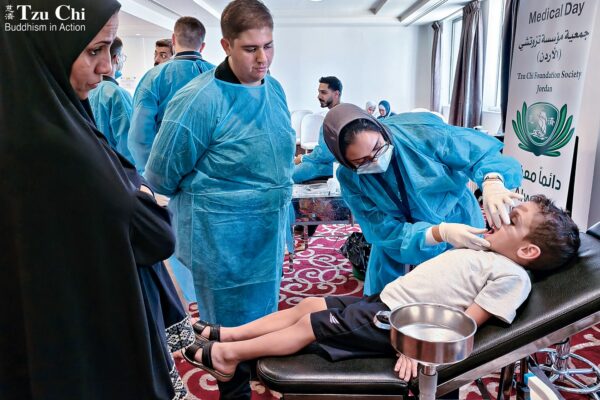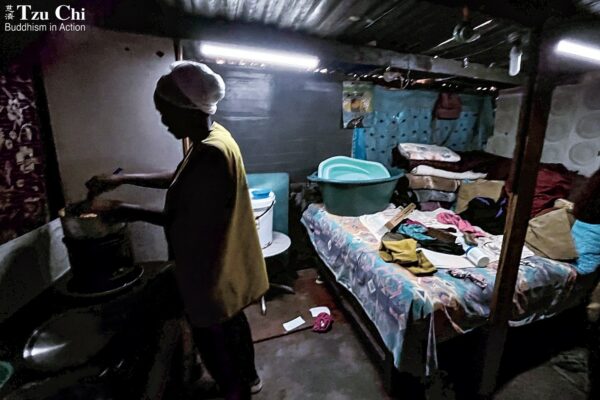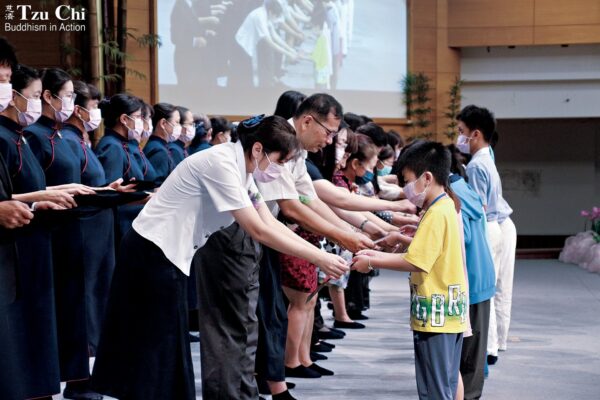Text and photos by Yew Chin Bey
Translated by Wu Hsiao-ting
The Tzu Chi Dialysis Center in Kedah, Malaysia, started providing vegetarian meals to their patients in April 2020 in an effort to promote vegetarianism during the pandemic. Five weeks after the meal program was launched, something unexpected happened.
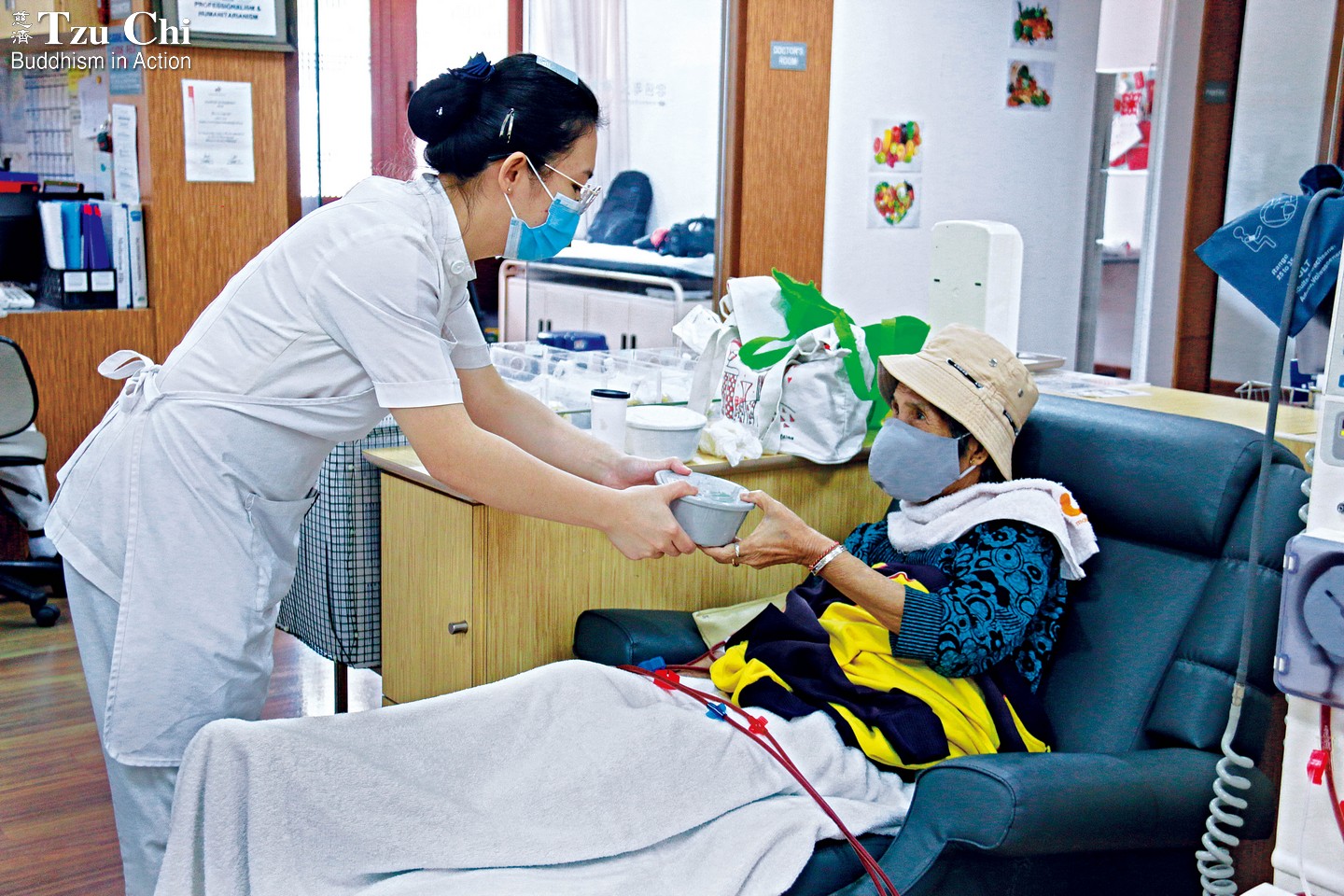
A nurse at the Tzu Chi Dialysis Center in Kedah, Malaysia, distributes vegetarian meals to patients who have signed up for a vegetarian meal program.
Hann Ping A/L Ba (陳漢彬), of Kedah, Malaysia, suffers from hereditary diabetes. The disease has led to his kidney failure, the amputation of his left foot, and even his blindness. The multiple blows depressed him so much he’s even thought of suicide. However, his spirits were lifted when he learned that he had been accepted as a patient at the Tzu Chi Dialysis Center in Kedah. The center provides free dialysis treatment to needy patients.
Despite his relief at being accepted, Hann Ping couldn’t help but feel some secret misgivings at the same time. Since the Tzu Chi Foundation is a Buddhist organization, he worried he’d have to become a vegetarian when he started his treatment at the dialysis center.
It was thus with some trepidation that he made his first visit to the center, where he learned to his relief that a vegetarian diet was not compulsory for patients there—even though only meatless food was allowed into the center. With his misgivings dispelled, he started receiving treatment. While his body was being taken care of at the center, the kindness and care shown by the nursing staff, other patients, and the Tzu Chi volunteers who served there brightened his dark inner world. He began to think more positively, telling himself that he had to take good care of himself so that the love and help he had received from others wouldn’t be wasted. He was happy that he had gotten to know many people at the center.
During his dialysis sessions, Hann Ping often watched programs on Da Ai TV—a station run by the Tzu Chi Foundation. That was how he came to hear Dharma Master Cheng Yen encouraging everyone to eat vegetarian. The nurses at the center also often shared with him the benefits of a vegetarian diet. His heart began to warm toward such a diet, but he always put a stop to those thoughts. He had had to depend on his family to tend to his needs since he fell ill, and he didn’t want to add to their burden by asking them to cook vegetarian meals for him.
Things took a turn after the pandemic broke out, when Tzu Chi Kedah decided to start providing patients at the dialysis center with vegetarian meals. A nurse at the center made a covenant with Hann Ping that they would adopt a vegetarian diet together. Hann Ping thus decided to begin eating vegetarian. On the days when he has dialysis, he brings a meal box to the center to take home the food provided by Tzu Chi. On the days when he doesn’t, his sister, who lives with him, cooks for him.
Hann Ping has no preference for either vegetarian or non-vegetarian food. For him, food is just something that gives him energy to keep going. The reason he switched to vegetarianism was his respect for life. “Master Cheng Yen says that according to statistics, more than 2,000 animals are slaughtered every second to feed humans,” Hann Ping said. “Per second, not per minute! I was shocked to learn how many chickens, cows, and sheep are sacrificed for human consumption.”
Hann Ping declared that the most marked change he noticed in himself after he adopted a vegetarian diet was comfortable and regular bowel movements. Many dialysis patients suffer from constipation due to fluid and dietary restrictions. Hann Ping had experienced this too, but eating vegetarian improved that problem for him. He began to hope that he would reap other health benefits from a vegetarian diet, especially as the numbers from his blood tests had never been that good.
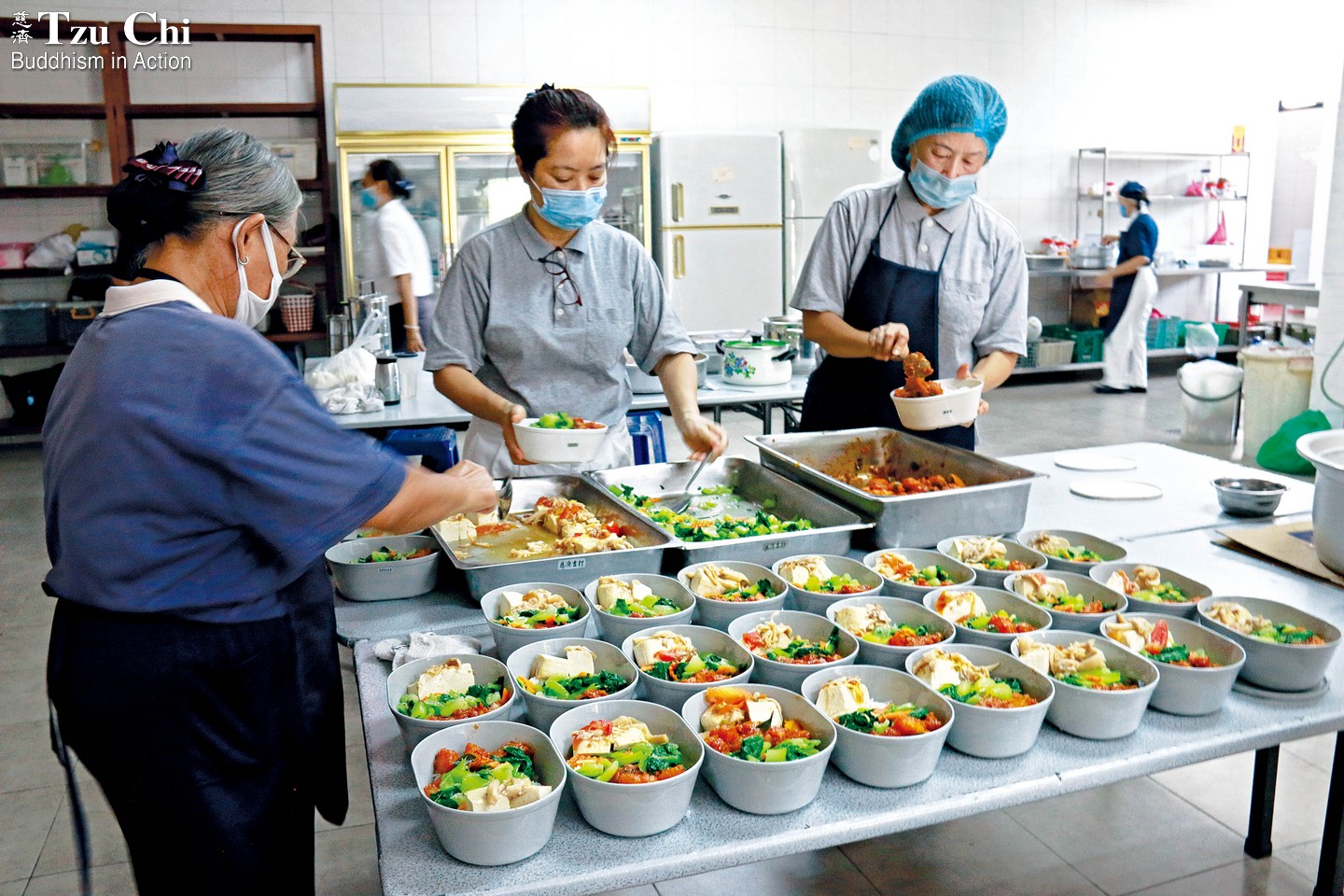
The delicious food prepared by Tzu Chi volunteers in Kedah shattered the preconceptions that many kidney patients had about vegetarianism.
Challenges for the cooking team
In response to Master Cheng Yen’s repeated appeals for people to eat vegetarian, and with the support of some volunteers who are entrepreneurs, the Tzu Chi Dialysis Center in Kedah started providing vegetarian meals to patients and their families on April 5, 2020. Volunteers hoped that this would inspire more people to give vegetarianism a try.
Volunteers and nurses at the dialysis center had often shared the benefits of vegetarianism with patients, but their response was lukewarm at best. When Ooi Lee Choo (黃麗珠), head of nurses at the center, asked patients about their willingness to try vegetarianism, she received responses like, “I don’t know what vegetarianism is. Vegetarianism is a foreign concept to us Malays,” or “I’ve never tried vegetarian food.” Such lackluster attitudes among patients made her doubt whether the vegetarian meal program would stand a chance of succeeding.
The Malaysian government initiated a nationwide Movement Control Order (MCO) on March 18, 2020, to slow the spread of COVID-19. The order made it difficult for volunteers to gather together to cook, and so Lamduan Sae Tan (陳南鸞), a dialysis patient who received her Tzu Chi volunteer certification in 2018, took on the responsibility of cooking for the program when it was started in April.
To make the food in time, she got up every morning at five and set to work. She felt happy that she could use her cooking skills to inspire more people to eat vegetarian. Besides, her family’s income had been hurt by the movement restrictions put in place by the government, and so the extra money she earned from cooking for the program helped relieve the financial strain on her family.
Originally from Thailand, Tan moved to Malaysia many years ago after marrying a man in the country. She had been in Malaysia long enough to know full well the food preferences and tastes of local people. And, as a dialysis patient herself, she had the additional advantage of knowing what food was better for such patients. The tasteful food she prepared for the program shattered people’s preconceptions of vegetarianism. The program gathered steam as more and more patients signed on and brought home the food she prepared.
Mohd Ikram, a dialysis patient who had joined the program, said that he knew that many illnesses were diet related. The coronavirus pandemic, for example, was suspected to have originated in animals and spread to humans in meat markets. He promised that he’d stay on a vegetarian diet as much as possible, especially as such a diet has the additional benefit of contributing to a more sustainable Earth.
The MCO that the government had announced to curb the virus was eased in May, so some culinary volunteers took over from Tan in mid-May and began cooking for the vegetarian program. Volunteers work every day but Friday at the Tzu Chi Jing Si Hall kitchen in Kedah to prepare vegetarian meals for dialysis patients at the center, their families, and Tzu Chi staffers. Program coordinator Lim Get Kee (林育芝) said that the biggest challenge facing the cooking team was how to create delicious but healthy food for participating patients. The team’s most important guideline is that their food must be low in oil, salt, sugar, and processed ingredients. That’s because the consumption of high amounts of sodium, potassium, and phosphorus can lead to arrhythmia, bone disorders, itchiness, or edema in kidney patients. On account of that, volunteers make a point of quick-boiling vegetables that are high in potassium before cooking them. Boiling food first removes some of the undesirable potassium.
“We searched online for vegetarian recipes,” said Seow Bee Teu (蕭美綢), a member of the cooking team, “and only then did we realize that some food was best avoided if you had kidney disease. We’ve learned a lot in the process.” After some work, they finally came up with recipes suitable for kidney patients.
Volunteers on the cooking team are divided into groups, with each group cooking two days a week. When a group finishes cooking for a meal, they photograph the three dishes they have prepared and send the images to the cooking team’s group chat. This is not to show off what they have cooked, but a way to allow other groups to know what dishes have been prepared so that the same dishes won’t appear on the menu again too soon. Given the limited ingredients they can use, the team really must tap into their creativity to add variety to the menu. For example, by using different cooking methods or seasoning, they are able to come up with different dishes. The dishes the team cooks are so good and savory that just looking at their images on a cell phone can make one’s mouth water.
The volunteers’ creativity and commitment have managed to create a rich assortment of dishes, despite the dietary restrictions for the 42 dialysis patients that have signed up for the vegetarian meal program. Their work has really impressed Hann Ping, mentioned near the top of this article. “The volunteers can create a variety of dishes using tofu alone,” said Hann Ping. “They make me feel that tofu can be as delicious as meat.” The food they prepare is so good Hann Ping doesn’t mind not eating meat at all!
●
Five weeks after the program was started, something happened that took Head Nurse Ooi completely by surprise. Ooi recounted the experience: “We run routine blood tests on our patients every three months. But when the reports came back over a month after the vegetarian program was launched, we noticed that the blood phosphate levels in many patients was significantly lower than before. When we looked more closely, we discovered that these patients had all taken part in our meal program!” In people with chronic kidney disease, high phosphate levels in the blood may cause pain in the bones or even lead to bone fractures. Clearly, the lowered phosphate levels were very good news for the patients.
Eight weeks into the program, the blood test results from another group of patients showed improvement too. All this definitely gave the staffers at the dialysis center more confidence to continue promoting vegetarianism!
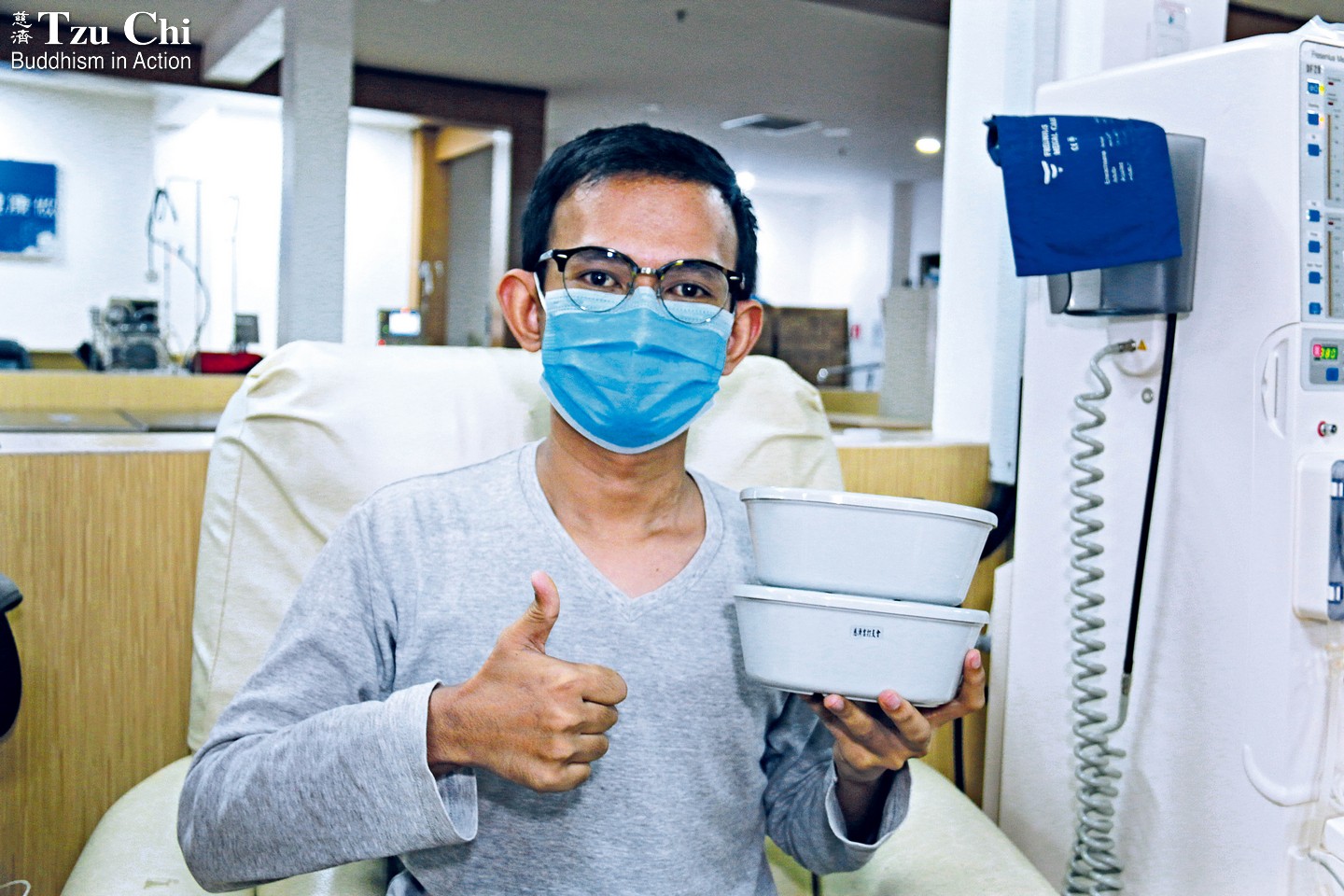
A patient gives a thumbs up for the vegetarian meals he has received at the Tzu Chi Dialysis Center in Kedah. He looks forward to the days during which he undergoes dialysis at the center. On those days he can enjoy the delicious vegetarian food prepared by Tzu Chi volunteers.

